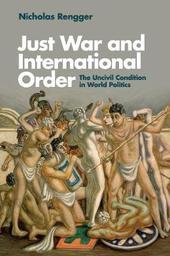
|
Just War and International Order: The Uncivil Condition in World Politics
Paperback / softback
Main Details
| Title |
Just War and International Order: The Uncivil Condition in World Politics
|
| Authors and Contributors |
By (author) Nicholas Rengger
|
| Physical Properties |
| Format:Paperback / softback | | Pages:220 | | Dimensions(mm): Height 226,Width 152 |
|
| ISBN/Barcode |
9781107644748
|
| Classifications | Dewey:327 |
|---|
| Audience | | Professional & Vocational | |
|---|
| Illustrations |
Worked examples or Exercises
|
|
Publishing Details |
| Publisher |
Cambridge University Press
|
| Imprint |
Cambridge University Press
|
| Publication Date |
4 April 2013 |
| Publication Country |
United Kingdom
|
Description
At the opening of the twenty-first century, while obviously the world is still struggling with violence and conflict, many commentators argue that there are many reasons for supposing that restrictions on the use of force are growing. The establishment of the International Criminal Court, the growing sophistication of international humanitarian law and the 'rebirth' of the just war tradition over the last fifty years are all taken as signs of this trend. This book argues that, on the contrary, the just war tradition, allied to a historically powerful and increasingly dominant conception of politics in general, is complicit with an expansion of the grounds of supposedly legitimate force, rather than a restriction of it. In offering a critique of this trajectory, 'Just War and International Order' also seeks to illuminate a worrying trend for international order more generally and consider what, if any, alternative there might be to it.
Author Biography
Nicholas Rengger is Professor of Political Theory and International Relations at the University of St Andrews. His scholarly interests range across political theory and international relations and include philosophy, intellectual history and contemporary philosophical and political theology. He has published in all of these areas and his recent publications include Critical International Relations Theory after 25 Years (edited with Tristram Benedict Thirkell-White, Cambridge University Press, 2007) and Evaluating Global Orders (Cambridge University Press, 2011).
Reviews'A literate and persuasive account in the context of just war and intervention of how reason coupled with good intentions can unwittingly help expand state authority and the use of force at home and abroad. Rengger's arguments also show how historically informed reason coupled with a deeper understanding of community can provide compelling arguments for restraint.' Richard Ned Lebow, King's College London 'Rengger is a prominent figure in the field of International Political Theory, and this book, which is the product of his long-term engagement with the just war tradition and the political philosophy of Michael Oakeshott, provokes scholars to think in new ways about the relation between military conflict and the normative foundations of international political life. It is a landmark text; insightful, daring, and a pleasure to read.' Cian O'Driscoll, University of Glasgow 'Rengger's remarkable fusion of political philosophy and international relations theory yields a potent critique of recent dreams of creating a better world by ethically grounded force. His analysis of how disastrous good intentions inspired by the current rhetoric of universal justice and human rights may prove is indispensable for understanding what is sometimes described as the post-Westphalian world order.' Noel O'Sullivan, University of Hull 'Harnessing an impressive array of literatures across the fields of political theory, international relations and international legal theories, political theology and the history of warfare, Nicholas Rengger has written a subtle set of arguments against recent and contemporary practices of moral interventionism ... this book stands out for its philosophical sophistication, its singular use of intellectual history and the measured consistency of its own argument.' Richard Beardsworth, International Affairs 'This penetrating analysis ... argues that the revival of just war thinking after WWII has helped to expand rather than constrain, the use of force in international relations ... Recommended. Graduate, research, and professional collections.' M. Amstutz, Choice
|